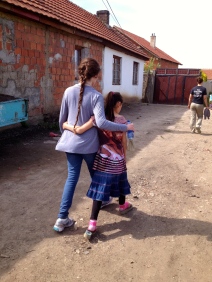A Special Friendship
She pulled out a chair and motioned for me to sit, a stranger given a gift a hospitality from a girl of about ten or eleven. She is an Ashkali, one of Kosovo’s outcasts, shunned, despised. I sat, shy and uncomfortable at the chasm of language that separated, too prideful to make a mistake. I looked at her, wishing I could say something, not having the courage to speak at all.
“Say ‘thank you,’” came my friend’s quiet, but firm urging from behind. “You know how to say that.” It was true; at least I could say “Falamandarit.” The single Albanian word broke the ice of my cowardly selfishness and I begin to slowly interact with these precious children: high-fiving a boy of three, waving to pre-teen girls in a universal gesture of friendship, delightfully observing as the students of Elizabeth Gowing’s IDEAS project had their photograph taken. But it was the girl who offered me a seat that I had to connect with again. We found each other in the midst of  the gathering and embraced before I had to head downstairs with the American team. I pointed and gestured inviting her to walk with me. So began a stroll of close friendship: my arm around her shoulders; hers around my waist, our bodies pressed close, bridging the language chasm with touch and looks of affection. The child walked as my shadow and support; aid as I navigated the uneven terrain of the slum she called home. As we passed a decent house with chickens in the front yard, she managed to communicate thorough excited animation that she lived there. Finally, the moment that I had been dreading arrived and I guessed by her expression that she feared this as much as I. A fellow student and friend captured our images in picture, me smiling trying to project enjoyment over meeting; even though I was sorrowful over the inevitable. Looking at the photograph later, I saw the child turned friend somber and sad, mirroring how I felt inside.
the gathering and embraced before I had to head downstairs with the American team. I pointed and gestured inviting her to walk with me. So began a stroll of close friendship: my arm around her shoulders; hers around my waist, our bodies pressed close, bridging the language chasm with touch and looks of affection. The child walked as my shadow and support; aid as I navigated the uneven terrain of the slum she called home. As we passed a decent house with chickens in the front yard, she managed to communicate thorough excited animation that she lived there. Finally, the moment that I had been dreading arrived and I guessed by her expression that she feared this as much as I. A fellow student and friend captured our images in picture, me smiling trying to project enjoyment over meeting; even though I was sorrowful over the inevitable. Looking at the photograph later, I saw the child turned friend somber and sad, mirroring how I felt inside.
“It’s time to go,” said my leader in a tone of understanding, as I pressed the child close, in a mother-like grip and stroked her hair, both of us reluctant to part. He had given her a gift in my name and later told me, “Something special happened upon the meeting of you and your friend.” Indeed it did.
Laurel Plimpton


You must be logged in to post a comment.